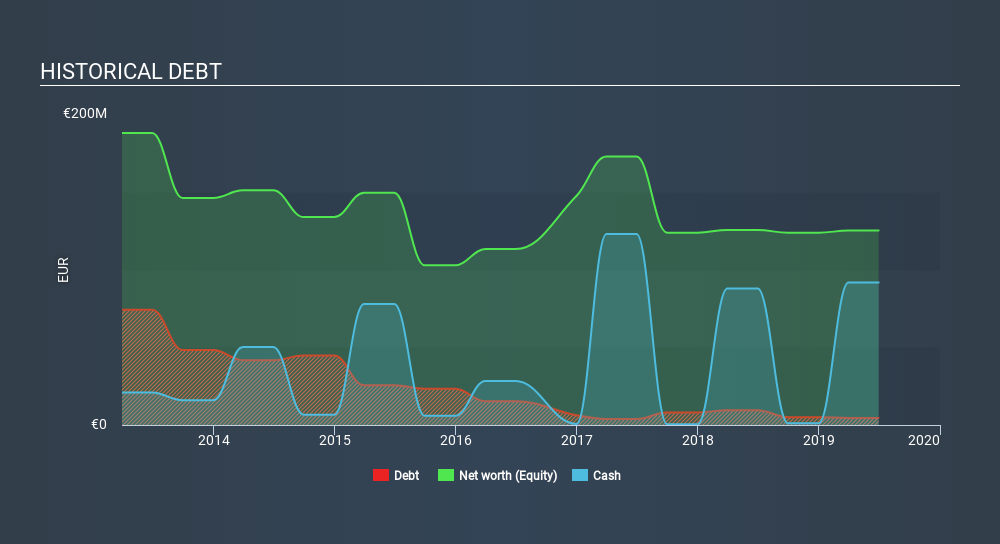
David Iben put it well when he said, 'Volatility is not a risk we care about. What we care about is avoiding the permanent loss of capital. So it seems the smart money knows that debt - which is usually involved in bankruptcies - is a very important factor, when you assess how risky a company is. We can see that ALBA SE (FRA:ABA) does use debt in its business. But is this debt a concern to shareholders?
What Risk Does Debt Bring?
Debt is a tool to help businesses grow, but if a business is incapable of paying off its lenders, then it exists at their mercy. Part and parcel of capitalism is the process of 'creative destruction' where failed businesses are mercilessly liquidated by their bankers. However, a more frequent (but still costly) occurrence is where a company must issue shares at bargain-basement prices, permanently diluting shareholders, just to shore up its balance sheet. Having said that, the most common situation is where a company manages its debt reasonably well - and to its own advantage. When we think about a company's use of debt, we first look at cash and debt together.
View our latest analysis for ALBA
How Much Debt Does ALBA Carry?
As you can see below, ALBA had €4.55m of debt at June 2019, down from €9.46m a year prior. But on the other hand it also has €91.6m in cash, leading to a €87.0m net cash position.

How Healthy Is ALBA's Balance Sheet?
According to the last reported balance sheet, ALBA had liabilities of €45.0m due within 12 months, and liabilities of €31.4m due beyond 12 months. Offsetting these obligations, it had cash of €91.6m as well as receivables valued at €36.8m due within 12 months. So it actually has €52.0m more liquid assets than total liabilities.
This surplus suggests that ALBA has a conservative balance sheet, and could probably eliminate its debt without much difficulty. Succinctly put, ALBA boasts net cash, so it's fair to say it does not have a heavy debt load!
Notably, ALBA made a loss at the EBIT level, last year, but improved that to positive EBIT of €2.2m in the last twelve months. When analysing debt levels, the balance sheet is the obvious place to start. But it is ALBA's earnings that will influence how the balance sheet holds up in the future. So if you're keen to discover more about its earnings, it might be worth checking out this graph of its long term earnings trend.
Finally, a business needs free cash flow to pay off debt; accounting profits just don't cut it. While ALBA has net cash on its balance sheet, it's still worth taking a look at its ability to convert earnings before interest and tax (EBIT) to free cash flow, to help us understand how quickly it is building (or eroding) that cash balance. Over the last year, ALBA actually produced more free cash flow than EBIT. There's nothing better than incoming cash when it comes to staying in your lenders' good graces.
Summing up
While it is always sensible to investigate a company's debt, in this case ALBA has €87.0m in net cash and a decent-looking balance sheet. And it impressed us with free cash flow of €6.2m, being 274% of its EBIT. So we don't think ALBA's use of debt is risky. The balance sheet is clearly the area to focus on when you are analysing debt. But ultimately, every company can contain risks that exist outside of the balance sheet. For example, we've discovered 2 warning signs for ALBA that you should be aware of before investing here.
When all is said and done, sometimes its easier to focus on companies that don't even need debt. Readers can access a list of growth stocks with zero net debt 100% free, right now.
If you spot an error that warrants correction, please contact the editor at editorial-team@simplywallst.com. This article by Simply Wall St is general in nature. It does not constitute a recommendation to buy or sell any stock, and does not take account of your objectives, or your financial situation. Simply Wall St has no position in the stocks mentioned.
We aim to bring you long-term focused research analysis driven by fundamental data. Note that our analysis may not factor in the latest price-sensitive company announcements or qualitative material. Thank you for reading.
About DB:ABA
Excellent balance sheet slight.
Market Insights
Community Narratives





